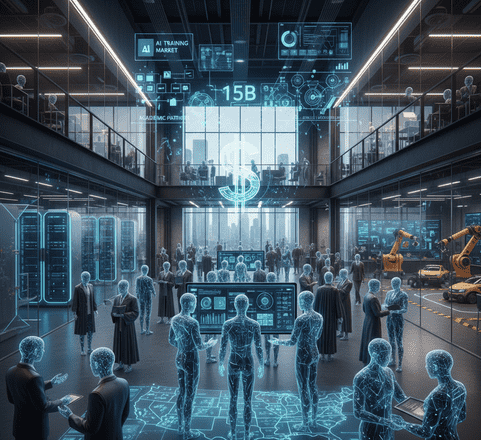What Today’s AI Agent Tools Teach Us and How to Become the AI Developer Employers Can’t Ignore
Introduction
Did you know?
More than 80% of enterprises are exploring ways to integrate custom AI agents into their workflows, making AI agent development capabilities a top investment area for 2025. And recent analysis shows that tools integrating DevOps best practices, including guardrails and deploy-to-production pipelines, are emerging as essential for secure, scalable AI deployments. (Source)
Think of designing AI and preparing it in production-ready engineering from the get-go! This crossroads of AI, DevOps, and security is where professional growth and organizational transformation collide.
1. Why Integration and Interoperability Should Be Your North Star
AI agent tools must connect fluidly with your existing data architecture. Professionals evaluating tools should ask: How easily can I plug this into my enterprise data lake, model evaluation pipeline, or monitoring dashboard? If connectivity is clunky, your AI efforts risk isolation and slow adoption.
What professionals can learn:
- Mastering AI developer skills today means understanding data connectors, APIs, and integration patterns along with model training.
- For organizations, prioritizing tools with strong interoperability ensures cost-effective, agile innovation.
Suggested read:
For more insights into how AI reshapes software engineering culture, check out:
How AI is Used in Software Development
2. DevOps-Driven AI: The New Foundation for Trust and Scale
The most promising platforms bake in DevOps features like version traceability, testing for response accuracy, ethical guardrails, and auditable deployment pipelines.
What professionals can learn:
- Building a career as an AI developer today means mastering Python for AI, but also CI/CD, testing frameworks, version control, and deployment monitoring.
- Organizations that embed DevOps into AI development can ensure consistent, transparent, and recoverable operations.
Suggested read:
For a deep dive into ethical AI craftsmanship, check out:
AI for Responsible Innovation: Mitigating Bias and Ensuring Fairness in AI Development
3. Security: The Silent Hero in AI Agent Tool Evaluation
AI agents often access sensitive business data and act on behalf of users, making security a foundational concern. Platforms offering built-in guardrails, encryption, role-based access control, and detailed audit trails are not optional; they’re essential.
What professionals can learn:
- Prioritize AI developer professional certificate programs that teach not only coding and model building but also AI security best practices.
- Organizations must choose platforms designed to harden data flows, enforce ethical usage, and protect from misuse.
4. Full Lifecycle Support: From Ideation to Monitoring
Choosing AI agent tools isn’t just about the code. You need platforms that support the entire lifecycle: planning, building, testing, deploying, monitoring, and iterating. Integrated dev cycles reduce friction and accelerate deployment maturity.
What professionals can learn:
- A career in AI today demands broad skills, from model prototyping in Jupyter to production orchestration, so AI coding courses that teach end-to-end workflows offer the greatest long-term value.
- Organizations adopting full-lifecycle platforms can better adapt to shifting business priorities, compliance needs, and performance standards.
Suggested read:
To envision the future of software developers in AI-driven engineering, don’t miss:
The Future of Software Development: How AI Developers Can Create Innovative Solutions
5. The Multi-Agent Landscape: Collaboration Meets Governance
The AI agent ecosystem is evolving rapidly. Multi-agent workflows, where agents collaborate, share context, and include human oversight, are rising. These platforms include governance layers, memory engines, and shared workflows designed for dynamic, intelligent systems.
- Future-ready machine learning certification programs need to include multi-agent design, human-in-loop systems, and ethical governance.
- Organizations exploring multi-agent deployment reduce bottlenecks through modular, resilient agent architectures.
6. Emerging Cloud-Native Approaches to Contextual AI
To stay responsive, AI agents must leverage cloud-native integrations, event buses, APIs, and orchestration services that feed real-time context and actions into agents. Using managed services like AWS EventBridge or Azure Logic Apps allows AI to function as a dynamic, platform-native actor.
What professionals can learn:
- Strengthen AI certification for Java and Python developers alike by mastering cloud integration tools, secure event pipelines, context management, and scalable orchestration.
- Organizations embracing cloud-native patterns unlock faster time-to-value, deeper integration, and robust scalability in AI deployments.
7. Impact on the Job Market: Transform or Be Left Behind
As AI agent tooling becomes mainstream, the demand for professionals with full-stack AI developer skills is skyrocketing. Roles that blend Python for AI, DevOps, security, integration, and governance are becoming the gold standard.
What organizations can learn:
- Investing in teams with AI developer professional certificates gives you not just coders, but system-minded thinkers who can deploy and maintain AI responsibly.
- The AI job market no longer rewards narrow specialization; versatile, DevSecOps-savvy AI developers are in scarce supply.
Suggested read:
For a broader vision of AI’s evolving professional landscape, check out:
The Future of AI Development: Why AI Prompt Engineer Certification Matters
Why AI CERTs® Certification?
If you’re a professional aiming to stand out or an organization seeking the edge in AI transformations, the path is clear: invest in rigorous, recognized programs that deliver AI developer certification built for today’s market realities.
AI CERTs® AI Developer certification marries the practical skills of Python for AI, end-to-end lifecycle tooling, cloud-native strategies, DevOps principles, and ethical frameworks, all wrapped into a recognized badge of excellence.
- For individuals: This certification helps you become an AI developer employers trust, armed with a machine learning certification and real-world AI tool fluency.
- For organizations: Hiring or sponsoring certification for your talent ensures your teams can architect, secure, deploy, and scale AI agents without learning everything on the fly.
Pursue an AI developer professional certificate from AI CERTs®. It’s the signal that you can build, deploy, and govern intelligent systems that drive lasting impact.
Recent Blogs

FEATURED
What U.S. Organizations Can Teach European Partners About AI Training Mandates
February 9, 2026
FEATURED
Leveraging AI Training Partnerships to Address Workforce Displacement Fears in Europe & America
February 9, 2026
FEATURED
Why AI Governance & Literacy Must Be at the Heart of University Curricula and Corporate Learning
February 7, 2026
FEATURED
Why the AI Instructor Shortage Is a Strategic Opportunity for Partners
February 7, 2026
FEATURED
The $15B U.S. AI Training Market- Where Enterprise & Academic Partners Fit In
February 7, 2026

